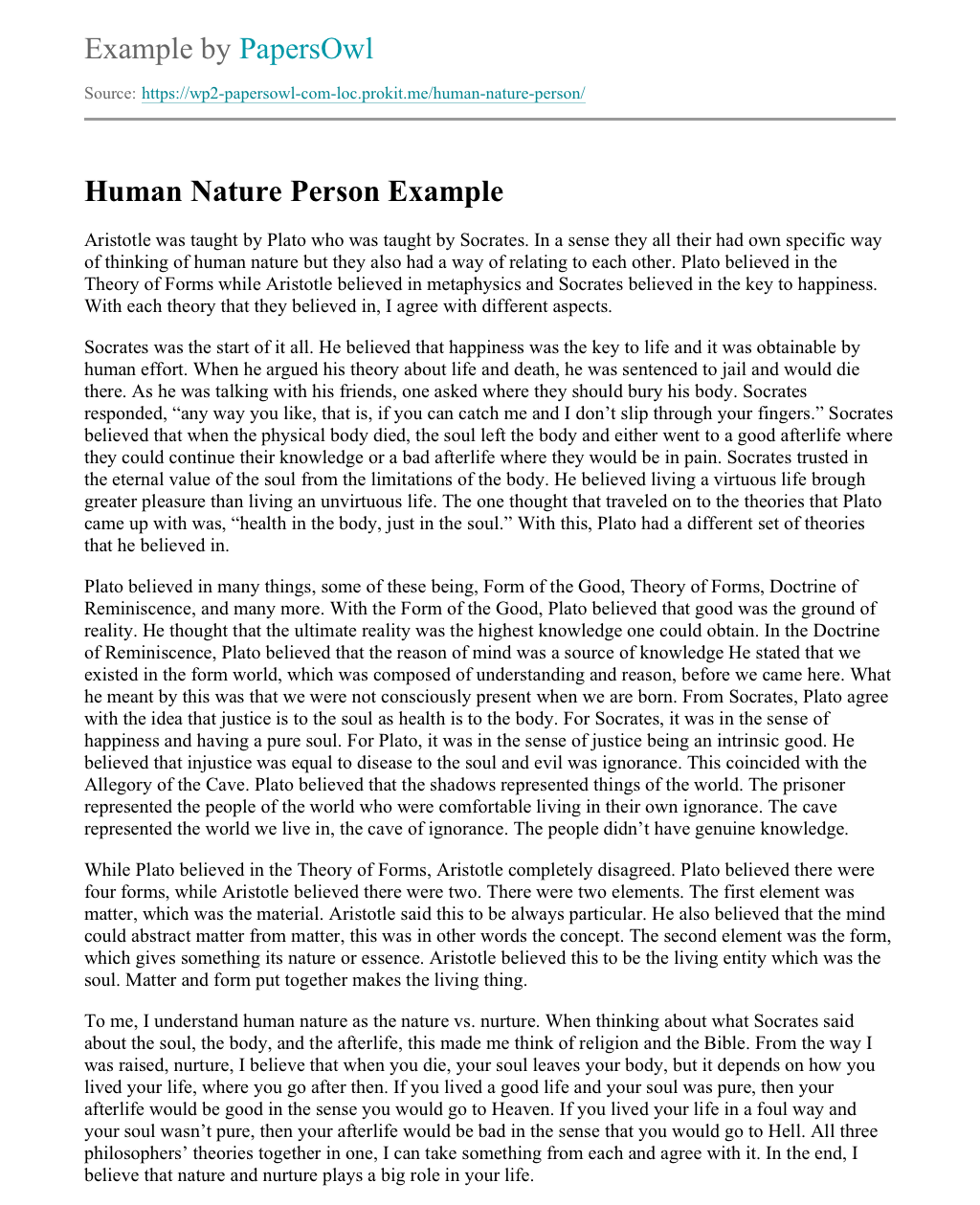
Apr 17, · Athenian View of Human Nature. The course of history has shown that during times of confusion or disaster, people's true human nature emerges. Unlike the view of Gandhi, in these moments humans behave violently and are concerned with self-interest, supporting the Athenian's view of human motivation The Athenians held the belief that the three motives for human nature are security, honor, and self-interest, and these cause people to be inherently violent. When there is a breakdown of law and order, a state of unprecedented lawlessness occurs and during the confusion, people’s values revert to a barbaric state Athenian View of Human Nature Words4 Pages The course of history has shown that during times of confusion or disaster, people's true human nature emerges. Unlike the view of Gandhi, in these moments humans behave violently and are concerned with self-interest, supporting the Athenian's view of human motivation
The Athenian Thesis and Thucydides’ Moral
This essay analyzes how in The History of the Peloponnesian WarThucydides argues against the Athenian Thesis, and provides evidence that justice will always come to those who disregard it.
Humans, inherently self-serving, constantly forgo justice for selfish motives. Thucydides calls upon the reader to infer a moral from his History rather than explicitly stating the lesson which he instructs. The Athenian thesis builds on an irreverence for justice and piety, and relies instead upon three human motives: ambition, fear, and advantage, athenian thesis human nature. Thucydides critiques human nature by exposing these inherent, self-seeking motives.
Thucydides, who disagrees with the Athenian Thesis, demonstrates the value of justice by describing the fall of those who act unjustly. The Athenian thesis shows an indifference, even a disbelief, to justice. Athens regards diplomacy in a realpolitik sense, focusing on the practical rather than ethics. To the Athenians, there exists the dominator and the dominated—and the weak will always be controlled by the strong, athenian thesis human nature. The Athenians believe that they, having strong naval powers and a cultured society, should fill the role as leader to maintain cohesion after the Persian Wars.
In accordance with this Athenian philosophy, a morality clause is nonexistent, athenian thesis human nature. The Athenians further explain that they should not be punished for acting according to human instinct.
The Athenians claim that, had the Spartans been in the position of the Athenians, they too would stop at nothing to preserve the empire they built. The Spartans therefore criticize the Athenians and console themselves with words of justice and piety precisely because they are not in an advantaged position. The Spartans, even when in a superior position, violate the morals from which they claim to abide. The Spartans, then, are hypocrites. When the Athenians near their demise, Thucydides reaffirms athenian thesis human nature general lack of real belief in justice and piety.
Throughout most Athenian speeches, the speakers attribute no credit to the gods athenian thesis human nature justice for their successes. In such dire circumstances, as a last resort, the Athenians abandon their scorn and appeal to a moralistic approach. It seems that neither the Spartans nor the Athenians respect the significance of the athenian thesis human nature. Instead, the Greeks act selfishly, behaving however will best serve them in that instance.
Perhaps Thucydides argues that the Greeks do not truly believe in justice and piety, but simply use such language when it might benefit them. The juxtaposition of these two events shows how Thucydides mocks the Athenians—they boast of their refined society but resort to athenian thesis human nature behavior when faced with misfortune.
In a very similar way, Thucydides describes the Melian dialogue just before explaining the disaster at the Sicilian Expedition, what led to Athenian destruction.
This construction allows Thucydides to describe what can occur when justice is disregarded, athenian thesis human nature.
He writes his History in a traditional tragic procession of pride, até, nemesis: the Athenian pride leads to their demise. The Athenians who, to Thucydides, act impiously athenian thesis human nature unjustly, reap the misfortune they deserve. Thucydides argues against the Athenian Thesis, athenian thesis human nature, which denies a sense of justice, and demonstrates the outcome to those who disregard justice.
Thucydides is a writer of tragedy. He reports the events of a deadly war while simultaneously exposing the—sometimes appalling—nature of humankind.
The real tragedy, though, is that neither side has a sense of morality, because everyone simply serves their own interests. Only the Athenians are honest about their motives: they do not mask their true intentions behind superfluous language of justice and piety. Thucydides, and Paul Woodruff. On Justice, Power, and Human Nature: Selections from the History of the Peloponnesian War.
Hackett, Skip to main content Skip to footer Fall This essay analyzes how in The History of the Peloponnesian WarThucydides argues against the Athenian Thesis, and provides evidence that justice will always come to those who disregard it.
Work Cited Thucydides, and Paul Woodruff. Footer Search this website.
The Myth of Human Nature
, time: 24:11Athenian View of Human Nature Essay | Many Essays

Athenian View of Human Nature Words4 Pages The course of history has shown that during times of confusion or disaster, people's true human nature emerges. Unlike the view of Gandhi, in these moments humans behave violently and are concerned with self-interest, supporting the Athenian's view of human motivation The Athenian thesis builds on an irreverence for justice and piety, and relies instead upon three human motives: ambition, fear, and advantage. Thucydides critiques human nature by exposing these inherent, self-seeking motives Mar 21, · Human nature is a person’s way of thinking, feeling and acting. Socrates said that human nature was not affected by one’s wealth or one’s victories. He claimed that it was all based on what we were truly searching for, whether it
No comments:
Post a Comment